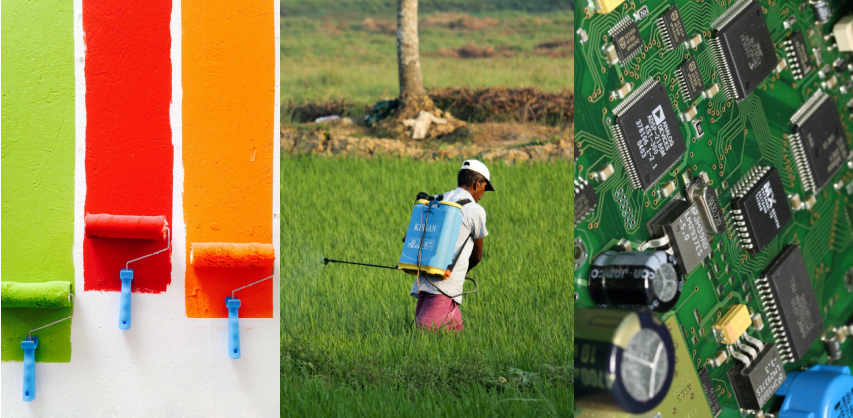
Bridging the gap 29.23
In case you missed it ...
Not a subscriber yet? Click here ('Bridging the gap' is free)
Here is a selection of recently published Quick Insights, Deep Dives or Perspectives that our subscribers get to read in full.
- Supply chains come under even more scrutiny (Transitions / Human Rights)
- PFAS - paints, pesticides and 'puters (Built Environment / Wellness)
Plus a few from the archives:
- Will Sustainable Aviation Fuel make airlines sustainable? (Greener Energy Applications)
- The precipice of a raging food catastrophe (Agriculture / Natural Capital)
- Hospitals and sustainability (Built Environment / Wellness)
What subscribers are reading this week
Supply chains come under even more scrutiny
(Transitions / Human Rights, Premium and Professional)
As public opinion leads, legislation follows, at least in Europe. The most recent legislative move is on deforestation, but it's just one of a wave of new laws and regulations.
Behind legislation comes litigation.
It's important that all investors (asset owners and asset managers) prepare for the upcoming changes and understand those legislative developments holistically, rather than focusing on individual measures in isolation.
Extensive and often complex supply chains lie at the heart of our current economic system. For some companies these supply chains go beyond just being a part of their raw material sourcing process - they are an intrinsic element of their competitive advantage. Recent engagement from investors, combined with legislation action, has brought into focus the fact that many companies have limited knowledge of what happens upstream of their direct operations.
While the recent European Union’s Deforestation Regulation has got a lot of attention, it's only the latest in a wave of legal moves, including measures relating to human rights, and moves on biodiversity and our oceans.
Increasingly, this lack of knowledge of what happens upstream, about the impacts of our supply chains, is becoming unsustainable. There are three main pressures that are forcing change - social demands, new environmental and human rights legislation, and litigation.
In this blog we focus on new legislation in Europe, but in a later blog we shall start to pull this all together. Looking at this as a tick box compliance process, law by law, is just inviting future additional risk.
Link to blog 👇🏾


PFAS - paints, pesticides and 'puters
(Built Environment / Wellness, Professional)
Per- and poly-fluoroalkyl substances or PFAS are a group of human-made compounds (they do not occur naturally) that contain carbon-fluorine bonds, which is one of the strongest bonds in organic chemistry.
They are commonly referred to as “forever chemicals” because they don’t naturally break down over time. There are more than 10,000 chemicals classified as PFAS and they have been used commercially for more than 80 years.
They are very effective at repelling water and oils, are good surfactants (wetting agents) as well as being good insulators. As a result they have been used extensively in food packaging, plastic containers, non-stick pans, fabrics, electronics, fire-fighting foams, detergents and cosmetics amongst others.
As well as being 'forever' they are increasingly 'everywhere'. That's becoming a problem. There are a number of key issues with PFAS that have been unearthed in recent years that mean that a rethink needs to be had over their use.
In this Perspective we discuss PFAS, the environmental and health issues that are driving increased legislation as well as the search for alternatives.
We shall also look at three case studies: their use in paints (helps them stick better), in pesticides (helps the liquids disperse) and in semiconductors (in various stages of their manufacturing process).
Link to blog 👇🏾

From the archives
Will Sustainable Aviation Fuel make airlines sustainable?
(Greener Energy Applications, Premium and Professional)
Willis Lease Finance Corporation and its subsidiary Willis Sustainable Fuels (UK) have submitted planning permission applications for a commercial scale Sustainable Aviation Fuel (SAF) facility on Teesside in the North East of England.
SAFs have the potential to replace some (maybe most) of the fossil fuels used to produce jet kerosene. This could reduce, but not eliminate the industry's Green House Gas (GHG) emissions. But, there are some material obstacles to overcome including cost, and an absence of enough suitable biological feedstocks. The cost aspect looks solvable, but the feedstock challenge could be more material.
We wrote about this in May.
Link to blog 👇🏾

The precipice of a raging food catastrophe
(Agriculture / Natural Capital, Professional)
Countries in Southeast Asia are facing an increased risk of haze, drought, and water shortages due to the declaration of El Niño this year. Dry conditions are expected to persist for about a year starting from either July or August. The United States National Oceanic and Atmospheric Administration predicts that El Niño will strengthen towards the end of 2023, with a 56% chance of it peaking as a strong event and an 84% likelihood of it being a moderate event.
Events like El Niño can exacerbate weather for months on end. Persistent extreme weather over longer periods can have longer term devastating impacts. Back in January we wrote about the threat and impact of persistent drought in the Horn of Africa which has impacted the growth of shrubs and grasses that livestock depend on. In turn that livestock is the primary source of both income and nourishment for the local population. The UN Secretary General recently declared that "we are on the way to a raging food catastrophe" with almost 26 million people facing extreme hunger in the area. With international aid efforts under pressure the situation could worsen.
The situation in the Horn of Africa foreshadows similar shocks to the food system globally.
Link to blog 👇🏾

Hospitals and sustainability
(Built Environment / Wellness, Professional)
According to the National Audit Office (NAO), the government will miss its target to build 40 hospitals by 2030, made in Boris Johnson’s 2019 manifesto. The NAO analysed the New Hospitals Programme and found that only 32 will be built in time. There were also concerns raised about how hospitals were being designed and built.
Hospitals and healthcare are important for a number of sustainability themes - health and wellness being an obvious one. There is a growing recognition that health is increasingly affected by climate change, while at the same time global healthcare systems, including inpatient facilities such as hospitals, have a substantial impact on the environment. By looking at factors such as emissions, renewables, logistics, care pathways, supply chains and partnerships, global healthcare has several opportunities to decrease their carbon footprint. We wrote about this in January.
Link to blog 👇🏾

Become a subscriber
Click here to joinPremium subscribers get to read in full...
- 'Quick Insights'
Designed to be short, easily digestible summaries to educate and stimulate thought and further exploration. 3-5 minute reads.
Professional subscribers get to read in full everything that Premium subscribers get plus...
- 'Perspectives'
Our unique perspective, based on our decades of financial and sustainability experience, on a key news story, development or report that is impacting sustainability investing, decision-making and transitions. We encourage you to think laterally. 5-6 minute reads.
- 'Deep Dives'
Setting the scene in more detail to aid understanding of how the transitions will develop and thinking laterally. 10-12 minute reads.

Please forward
to a friend, colleague or client
If this was forwarded to you, click the button below and sign up for free to get this email, 'What caught our eye' and the 'Sunday Brunch' in your inbox every week.
Please read: important legal stuff.
